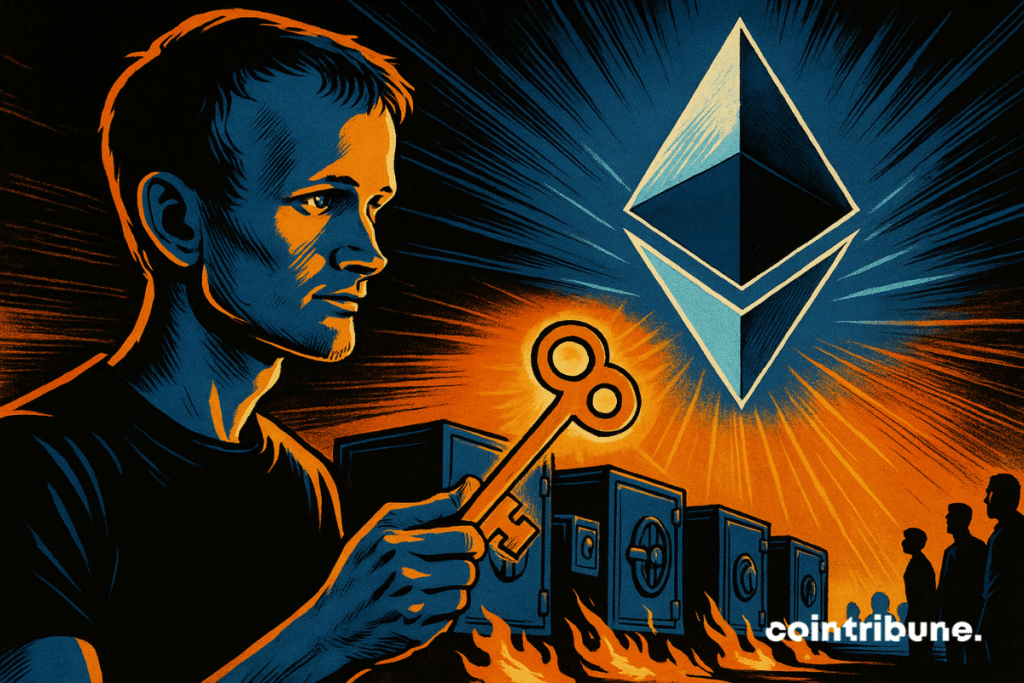Buterin Calls For Low-Risk DeFi To Support Ethereum
September 21, 2025
11h05 ▪
4
min read ▪ by
Luc Jose A.
What if Ethereum abandoned speculation to bet on stability? Vitalik Buterin proposes an unexpected strategic shift: making low-risk DeFi the main economic driver of the network. This is a sober vision, far from memecoins and NFTs, but potentially structuring. Like Google, whose search finances the ecosystem, Ethereum could find in this discreet but steady DeFi a durable foundation. This assumed disruption could redefine the priorities of the entire ecosystem.

In brief
- Vitalik Buterin warns about the gap between speculative profitability and Ethereum’s founding values.
- He proposes making low-risk DeFi protocols a central economic lever for the network.
- Stable yields offered by platforms like Aave could generate sustainable income, without speculative excesses.
- The strategy also includes developing new forms of stablecoins, like flatcoins or currency baskets.
Reconcile ethics and profitability : the bet on low-risk DeFi
While Tom Lee sees Ethereum as the biggest macro bet of the next 15 years, Vitalik Buterin reveals in his post a growing fracture within the ecosystem.
On one side, highly speculative applications (NFTs, memecoins, trading) generate strong activity on the blockchain and ensure substantial revenues through transaction fees. On the other, projects more aligned with the network’s founding ideals, like decentralization, fair access, or financial inclusion, struggle to achieve sufficient adoption to self-finance.
“This split has created a lot of dissonance in the community”, writes Buterin in his post. To reconcile these two worlds, he puts forward a concrete proposal: making low-risk DeFi a lever for generating stable income for Ethereum, without compromising its ethical values.
He notably takes the example of the Aave protocol, where yield rates for stablecoin deposits remain reasonable yet attractive. This type of crypto activity, although less flashy than leveraged trading, has the advantage of generating regular and predictable fees. In this regard, Buterin made the following proposals :
- Interest rates around 5 % for stablecoins considered safe, such as USDT and USDC;
- Yields exceeding 10 % for higher-risk stablecoins used in the same protocols;
- A more sustainable financial activity, judged to conform with Ethereum’s founding principles, as it does not encourage excessive speculation on the crypto market.
“The income generator does not need to be Ethereum’s most revolutionary or exciting application. However, it must at least not be actively unethical or embarrassing”, he specifies. Thus, Ethereum can rely on a solid economic base without giving in to the sirens of excessive financialization.
Start your crypto adventure safely with Coinhouse
This link uses an affiliate program.
Expanding his reflection, Vitalik Buterin draws a bold parallel with Google. In his eyes, Ethereum could learn from the technological giant’s model but without reproducing its excesses.
“Google does a lot of interesting and valuable things,” he acknowledges, citing Chromium browsers, Pixel smartphones, and the Gemini AI models. However, he points out that the vast majority of the company’s revenue comes from search and advertising, a model that pushed Google to adopt aggressive data collection practices, at the expense of its initial values.
However, Buterin believes that Ethereum can do much better, precisely thanks to its decentralized structure, which allows financial success and ethics to be reconciled.
Buterin’s perspective goes beyond existing protocols. He also calls to explore monetary innovations such as cryptos indexed to a currency basket or flatcoins, directly backed by consumer price indices.
The idea is to move away from a system too centered on the US dollar, particularly to meet the needs of populations living in low-income or high-inflation countries, often poorly served by traditional financial systems. These assets could broaden Ethereum’s impact while diversifying its sources of stability.
In a long-term vision, this strategy could allow Ethereum crypto to secure a sustainable economic base, while avoiding the pitfalls of surveillance capitalism. If low-risk DeFi protocols become the norm, they could offer the network a form of economic neutrality, both functional, ethical, and resilient.
Maximize your Cointribune experience with our “Read to Earn” program! For every article you read, earn points and access exclusive rewards. Sign up now and start earning benefits.
Diplômé de Sciences Po Toulouse et titulaire d’une certification consultant blockchain délivrée par Alyra, j’ai rejoint l’aventure Cointribune en 2019.
Convaincu du potentiel de la blockchain pour transformer de nombreux secteurs de l’économie, j’ai pris l’engagement de sensibiliser et d’informer le grand public sur cet écosystème en constante évolution. Mon objectif est de permettre à chacun de mieux comprendre la blockchain et de saisir les opportunités qu’elle offre. Je m’efforce chaque jour de fournir une analyse objective de l’actualité, de décrypter les tendances du marché, de relayer les dernières innovations technologiques et de mettre en perspective les enjeux économiques et sociétaux de cette révolution en marche.
DISCLAIMER
The views, thoughts, and opinions expressed in this article belong solely to the author, and should not be taken as investment advice. Do your own research before taking any investment decisions.
Search
RECENT PRESS RELEASES
Related Post


